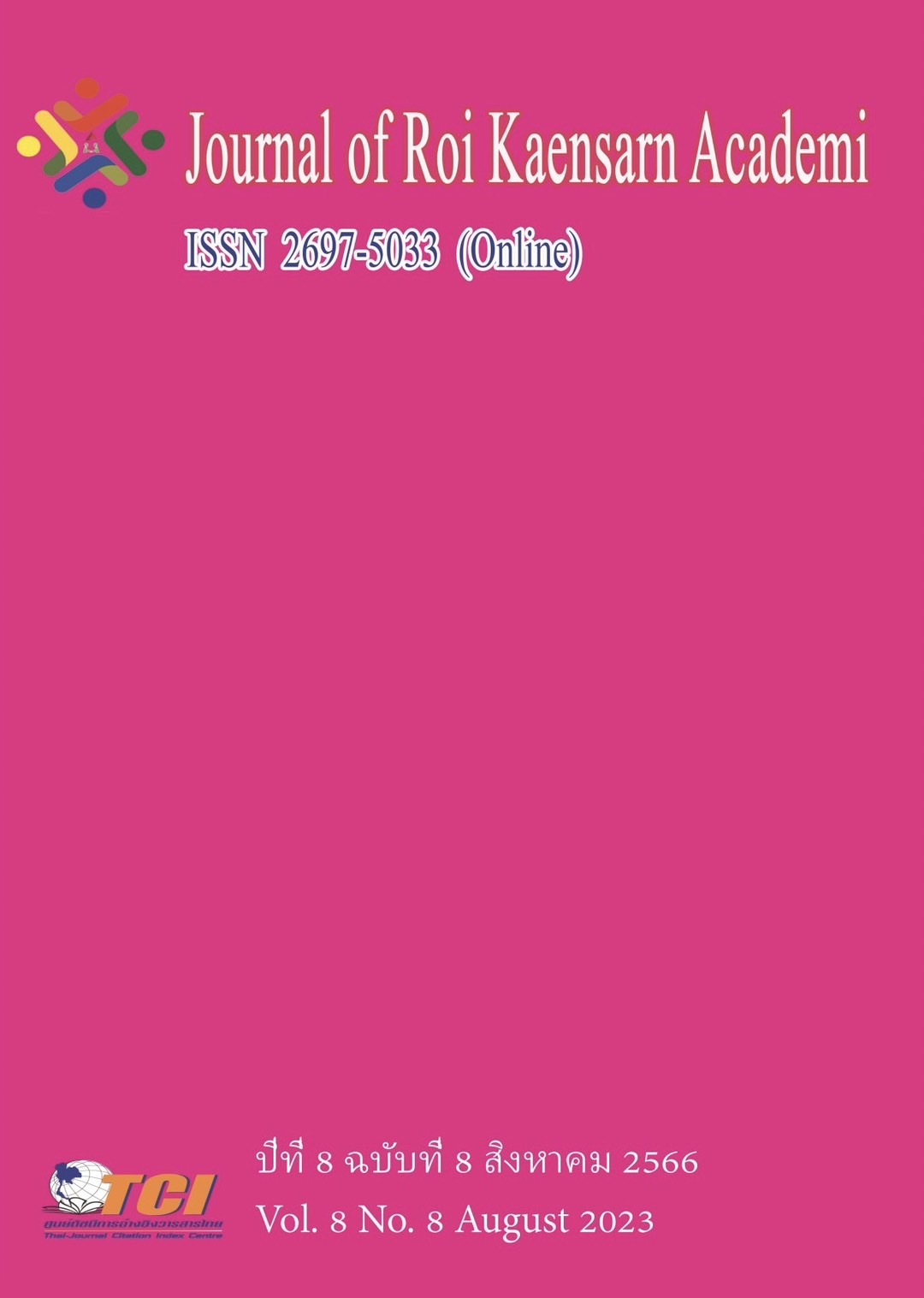Attitute towards Implementation of Contemplative Approach to Enhance Critical Thinking and Speaking Skills in the EFL Literature Classroom
Main Article Content
บทคัดย่อ
Article Details
เอกสารอ้างอิง
Ahnadpour, S.,Asadollahfam, H.,and Kuhi, D. (2022). The Role of Contemplative teaching in EFL Learners’ Speaking Development and Self-Regulation: Learners’ Attitutes. Research in English Language Pedagogy. 10 (2). 364-368. Bangkok Post. 2019. https://www.bangkokpost.com/business/1798104/why-english-matters-to-thailand.
Barbezat, L., & Bush, J. (2014). The impact of contemplative practices on the teaching of literature. Journal of Contemplative Inquiry. 1 (1), 67-83.
Djamaa, S. (2018). Computer in the School. 35 (2). 88-110. DOI: 10.1080/07380569.2018. 1463010.
Dodson-Lavelle, B. (2015). Contemplative practices in higher education: Powerful methods to transform teaching and learning. Journal of Transformative Education. 13 (3), 148-167.
Elismawati, Elismawati. (2018). Classroom Interaction Analysis is the EFL Speaking Class: A Study at English Department of IAIN Imam Bonjol Padang. Journal Polingua : Scientific Journal of Linguistics, Literature and Education. 5 (1), 25-32.
Hanh Thi Nguyen. (2019). Contemplative Practices in EFL Teacher Education: Pedagogical Possibilities and Challenges. The Journal of Language Teaching and Research. 10 (3), 627-635.
Hussain, I., & Mahmood, K. (2020). The attitudes of Pakistani EFL students towards a contemplative approach in the literature classroom. Journal of Research in Innovative Teaching & Learning. 13 (1), 37-48.
Inkeaw, M. (2020). A simple but unanswered question of why Thai students lack practical English communicative skills. Journal of Rattanabandit University. 15 (1).1-11.
Janpengpen and Suttikulpanich (2018). The impact of mindfulness meditation on Thai EFL students' reading comprehension and vocabulary learning. Kasetsart of Social Sciences, 39 (1), 104-110.
Kaowiwattanakul, S. (2021). CEFR Based Learning Approach: Using Literature to enhance EFL Students’ Reading Skills and Critical Thinking skills. English Language Teaching. 14 (11), 66-79.
Kim, S., & Han, G. (2016). Mindfulness meditation improved the English speaking proficiency of Korean EFL students. Journal of Pan-Pacific Association of Applied Linguistics, 20 (2), 91-106.
Kittisak, J., & Sukanya, K. (2020). Investigating the factors contributing to low English proficiency among Thai students. Journal of Language and Linguistics. 18 (1), 45-62.
Kuru Gönen, S. İpek. (2022). Mindfulness-based practices for EFL teachers: sample tasks and insights to cultivate mindfulness. Focus on ELT Journal. 4 (3), 78–93. https://doi.org/ 10.14744/felt.2022.4.3.6
Lao, R. (2018). Contemplative approach in EFL classroom: An investigation of its effects on EFL learners' reading comprehension. Journal of Pan-Pacific Association of Applied Linguistics. 22 (2), 85-103.
Li, X. (2022). Contemplative approach in the teaching of English literature: A case study of Chinese undergraduates. Journal of English Language and Literature. 68 (4), 599-617.
Ng, M. L., & Lee, J. C. K. (2018). The attitudes of Hong Kong EFL students towards a mindfulness-based approach in the literature classroom. The Journal of Asia TEFL, 15 (4), 1134-1146.
Nimonrat, P. S. (2015). Contemplative approach and EFL teaching and learning: A review of literature. Journal of Education and Practice. 6 (11), 86-90.
Nguyen, T. T., & Dao, V. T. (2020). Contemplative teaching and learning in EFL literature class: A study of Vietnamese students' attitudes. The Journal of Asia TEFL, 17 (4),
Ronan, J. T. (2006). The Contemplative Classroom: Overcoming Resistance and Cultivating Compassion. Radical Pedagogy, 8 (1).
Scida. E.E.& Jones, J.N. (2017).The impact of contemplative practices on foreign language anxiety and learning. Studies in Second Language Learning and Teaching. 7 (4)..573-599. Doi: 10.1446/sslit.2017.7.4.2.
Schenck, K., & Tang, X. (2015). A contemplative pedagogy approach, which incorporated mindfulness meditation and reflective writing, improved the academic writing skills of Chinese international students studying in the US. Journal of Academic Language and Learning, 9 (1), A105-A117.
Shih, M. F., & Lin, Y. H. (2017). The impact of contemplative approaches on sustainable development: A conceptual analysis. Journal of Sustainability. 9 (9), 1604.
Siriratphatthana, O. (2018). Contemplative approach in EFL writing classroom: Its effects on students' writing performance and mindfulness development. International Journal of English Linguistics. 8 (3), 201-214.
Srisuwan. S. (2018). Contemplative Education Learning Management to Approach the Humanity of Journalism.National Academic Conference: “How does proactive learning respond to Thailand 4.0?” 26-27 March 2012. Walailak University.
Suksawat, K. (2018). Multifaceted approaches to improving Thai students' English speaking skills. English Language Teaching. 11 (1), 55-63.
Suttikulpanich, P., & Janpengpen, P. (2020). The impact of a mindfulness-based intervention on Thai EFL students' speaking performance and anxiety. International Journal of English Linguistics. 10 (2), 43-55.
Thomas, N. (2019). Teaching L2 Speaking: recommending a Holistic Approacg.rEFLections. 26 (1). 134-145.
Zare-ee, A., & Nouri, A. (2019). The impact of a contemplative approach on the speaking ability of Iranian EFL learners. Iranian Journal of Language Teaching Research, 7 (3), 63-77.
Zhang, M. (2020). A mindfulness-based intervention improved the English speaking ability of Chinese EFL learners. Frontiers in Psychology, 11, 1342.
Zhang, L. (2021). The application of contemplative pedagogy in teaching English literature. Journal of Language Teaching and Research, 12 (2), 360-370.

